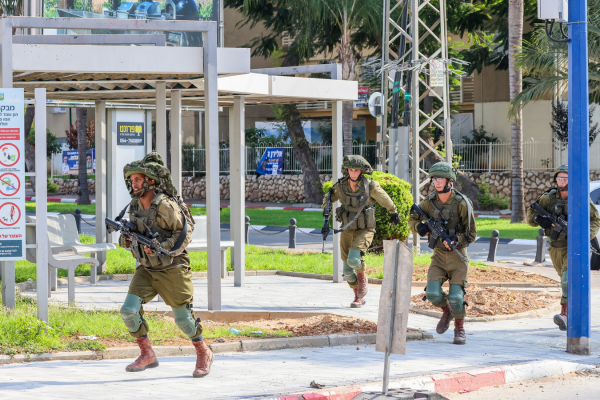‘Sderot is my home, it’s where I was born, since Oct. 7, I know that something has to change.’
By Amelie Botbol, JNS
The Israel Defense Forces Home Front Command last week approved the return of evacuees to many southern Israel communities, including the city of Sderot. However, many are not willing to return.
Bruria Shilon, 61, has returned to Sderot just once since Oct. 7, to pick up some winter clothing. “It was sad, extremely painful and scary,” she told JNS. “Originally, I thought I might stay the night, but I just couldn’t,” she added.
In the weeks after Hamas’s invasion of southwestern Israel, Shilon and 250 other evacuees from Sderot were housed in Tel Aviv’s Prima City Hotel at the state’s expense. While most of them have left, 52 evacuees ages 6 to 94 still live in some of the Prima City’s 106 rooms.
Approximately 200,000 Israelis were displaced from their homes both in the south and along the border with Lebanon after Oct. 7, taking up residence in hotels or finding other temporary living arrangements.
As a result of negotiations between Israeli mayors in the southwest and the Israeli government, those like Shilon who do not yet feel safe returning home will be allowed to remain in state-funded hotel rooms until July 7.
“I don’t have small children; I don’t need access to schools or kindergarten. If I did, I might have gone back already for them to receive proper education,” said Shilon of the evacuees who returned home following the IDF announcement.
Instead, Shilon remains in a small room at the Prima City with her daughter Ori, 23, and her dog Bean. Her mother, Rahel, 80, lives in a separate room.
“When people think of hotels, they picture a luxurious life—but those rooms are not built to take in a family for five months. There’s no space,” she said.
JNS spoke with Shilon in the Prima City’s lobby, one of a few crowded common areas in the hotel.
Adjacent to the lobby is a small dining room with just over a dozen indoor tables and a few more outside, where three times a day, the evacuees converge to share a state-funded meal. Some try to sit at the same table every day to restore some small sense of normalcy.
Dogs are often left in the lobby area during mealtimes, many shivering with fear at the unfamiliar surroundings.
While food, accommodation and transportation are taken care of by the government (for now), the evacuees have to pay out of pocket for everything else.
Those who were able to find alternative housing on their own received stipends in the amount of 200 shekels ($55) a day per adult and 100 shekels ($27) per child.
However, since the state has now green-lit the return of evacuees to some communities in the south, the stipends are expected to be reduced starting Mar. 1 to 120 shekels ($33) per adult and 60 shekels ($16) per child.
On weekdays, a van sometimes parks by the Prima City’s entrance out of which science lessons for children are organized. Women sit by the hotel entrance and sew while discussing their circumstances in disbelief.
“Parents use plastic bags to store their children’s clothing. They stay in the same room as their kids and have no intimacy,” said Shilon.
Birthdays have been a regular occurrence; one evacuee celebrated her 81st birthday at Prima City, and on another occasion, the Sderot municipality organized a group bat mitzvah.
“We are safe and grateful that we have a roof over our heads and food on our plates, but this is not a life,” said Shilon. “We have no peace. We are full of uncertainties. It’s eating us alive,” she added.
Shilon’s mother arrived in Sderot in 1954 at age 10 with her parents and two sisters. She traveled by boat from Morocco to France that year, where she boarded a vessel called Artza which brought her to Israel.
Acts of antisemitism and violence reminiscent of Hamas’s Oct. 7 pogrom were among the reasons her mother left Morocco for the Jewish state, said Shilon.
“One day, in Morocco, my mother was on her way back from the market at 8 p.m. on a quiet night when she saw Arabs cut a pregnant woman open and smash her baby against a wall. Nothing is new under the sun,” she lamented.
From her apartment close to Sderot’s police station, which was overtaken by terrorists on Oct. 7, Shilon witnessed fierce fighting between Hamas and Israeli forces.
“Some terrorists reached our neighborhood. The army told us not to open our doors to anyone,” she said. “I panicked when I heard on the news that they had managed to enter some houses and were slaughtering people.”
During the invasion, Shilon told her daughter Ori to hide in a tiny space between a cabinet and one of the walls in her apartment. She then used a stove to blockade the front door. “We were so afraid to go out. We did not leave the apartment for three days,” Shilon said.
“We did not sleep for a minute, how could we?” she said. “When soldiers finally came to take us out, I asked them to recite Shema Yisrael to make sure that they were Jewish,” Shilon said.
While Shilon misses Sderot, which she referred to as a warm and welcoming village where residents live as one big family, she is not prepared to return.
“We managed to live with rockets for 25 years, but what happened on Oct. 7 was a game changer,” she said. “Sderot is my home. It’s where I was born. Since Oct. 7, I know that something has to change. Life is short and we have to put ourselves first. If I have to leave Sderot, I will,” she said.
